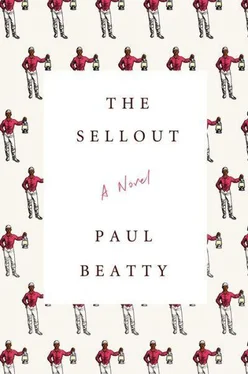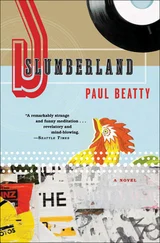I took my usual seat, the one closest to the stairwell, kicked back, and stretched my feet into the aisle, wielding the board like a fiberglass African shield, deflecting the spitting barrage of pollyseed shells and insults as best I could.
“Fuck you.”
“Fuck you.”
Banished and hurt, I scuttled to the back of the bus, deposited my surfboard on the rear seat, and lay down on it like a heartbroken fakir sleeping on a bed of nails, trying to displace the emotional pain with the physical. The bus lumbered down Rosecrans, the unrequited love of my life, Marpessa Delissa Dawson, calling out stops like a Buddhist timekeeper, while a crazy man three rows in front of me recited the morning mantra: I’m going to fuck that black bitch up. I’m going to fuck that black bitch up. I’m going to fuck that black bitch up. I’m going to fuck that black bitch up.
There are more cars in Los Angeles County than in any other city in the world. But what no one ever talks about is that half those cars sit on cinder blocks in dirt patches passing for front yards from Lancaster to Long Beach. These not-so-mobile automobiles, along with the Hollywood sign, the Watts Towers, and Aaron Spelling’s 56,500-square-foot estate, are the closest L.A. gets to approximating the ancient marvels of engineering like the Parthenon, Angkor Wat, the great pyramids, and the ancient shrines of Timbuktu. Those two- and four-door rusted pieces of antiquity stand impervious to the winds and acid rains of time, and like Stonehenge, we have no idea what purpose these steel monuments serve. Are they testaments to the bitchin’ and firme hot rods and lowriders that grace the covers of custom-car magazines? Maybe the hood ornaments and tail fins are aligned with the stars and the winter solstice. Maybe they’re mausoleums, the resting places of backseat lovers and drivers. All I know is that each of these metallic carcasses means one less car on the road and one more rider on the bus of shame. Shame because L.A. is about space, and here one’s self-worth comes from how one chooses to navigate that space. Walking is akin to begging in the streets. Taxicabs are for foreigners and prostitutes. Bicycles, skateboards, and Rollerblades are for health nuts and kids, people with nowhere to go. And all cars, from the luxury import to the classified-ad jalopy, are status symbols, because no matter how shoddy the upholstery, how bouncy the ride, how fucked-up the paint job, the car, any car, is better than riding the bus.
“Alameda!” Marpessa shouted, and a woman scurried aboard, toting one too many plastic shopping bags and pinning her purse tightly to her side with her elbow. She made her way down the aisle scanning for vacancies. I can spot an L.A. newcomer a mile away. They’re the ones who board the bus smiling and greeting the other passengers, because they believe, despite all evidence to the contrary, that having to take mass transportation is only a temporary setback. They’re the ones sitting under the Safe Sex ads, looking up quizzically from their Bret Easton Ellis novels, trying to figure out why the assholes surrounding them aren’t all white and opulent like the assholes in the book. They’re the ones who jump up and down like game show prizewinners when they discover that In-N-Out Burger has both a secret menu and a double-top-secret menu. “Mustard grilled patties? Get the fuck out of here!” They sign up for open mikes at the Laugh Factory. Jog along the boardwalk, trying to convince themselves that the double penetration scene they shot in Reseda last week is only a stepping-stone to bigger and better things. La pornographie est la nouvelle nouvelle vague.
Many parents brag about their kid’s first words. Mommy. Daddy. I love you. Stop. No. That’s inappropriate. My father, on the other hand, liked to boast about his first words to me. They weren’t “Hello,” or a prayer, but a sentiment found in the first chapter of every Intro to Social Psych textbook ever written: We are all social scientists. And I suppose my first field research was conducted on the bus.
When I was young, the municipal bus system was called the RTD. Officially, the acronym stood for Rapid Transit District, but to Angelenos who lived in hellholes like Watts, La Puente, and South Central, too young or too poor to drive, it stood for Rough Tough and Dangerous. My first scientific paper, written at age seven, was “Passenger Seating Tendencies by Race and Gender: Controlling for Class, Age, Crowdedness, and Body Odor.” The conclusion was readily obvious. If forced to sit next to someone, people violated the personal space of women first and black people last. If you were a black male, then no one, including other black males, sat next to you unless they absolutely had to. Whereupon they’d reluctantly plop down next to me and invariably greet me with one of three security questions designed to assess my threat level.
1. Where do you live?
2. Did you see (insert sporting event or black-themed movie)?
3. I don’t know where you from, homie. But you see this knife/gun/contagious skin rash? You don’t fuck with me and I won’t fuck with you, cool?
I could tell from the way they pulled her arms into the ground that the bags were getting heavy, that she was barely holding on to her groceries and dreams. Even though she was exhausted and growing more and more despondent with each bumpy rise and fall of the worn-out suspension, she preferred to stand rather than to sit next to me. They come to L.A. aspiring to be white. Even the ones who are biologically white aren’t white white. Laguna Beach volleyball white. Bel Air white. Omakaze white. Spicolli white. Brett Easton Ellis white. Three first names white. Valet parking white. Brag about your Native American, Argentinian, Portuguese ancestry white. Pho white. Paparazzi white. I once got fired from a telemarketing job, now look at me, I’m famous white. Calabazas white. I love L.A. It’s the only place where you can go skiing, to the beach and to the desert all in one day white.
She held on to her vision rather than sit next to me, not that I blamed her, because by the time the bus hit Figueroa Boulevard, there were a number of people on board whom I wouldn’t have chosen to sit next to, either. Like the insane fucker who repeatedly pressed the “Stop Requested” button. “Stop this bus, goddammit! I want to get off! Where the fuck you going?” Even that early in the day, stopping a bus between designated stops was the same as asking the flight crew of an Apollo rocket to the moon to stop at the liquor store on the way — impossible.
“I said, Stop the motherfucking bus. I’m late for work, you fat fucking cow!”
Drivers, wardens, and concentration-camp commandants all have their own management style. Some like to sing to the passengers. Placating them with uplifting jazz age ditties like “Tea for Two” and “My Funny Valentine.” Others like to hide, sit low in their seats, and let the inmates run the asylum and the aisles, seat belts unfastened in case the need for a quick getaway arises. Marpessa was no disciplinarian, but she wasn’t a pushover either. Her average workday was filled with fights, purse snatchings, fare beaters, molestations, public intoxication, child endangerment, pandering, niggers constantly standing on the wrong side of the yellow line while the bus was in motion, and kicking game, to say nothing of the occasional attempted murder. Her union rep said a bus driver in this country is assaulted once every three days, and there were two things in the world Marpessa had long since decided she’d never be: a statistic and somebody’s “fat cow.” I don’t know how she resolved the problem — with a kind word or the threatening wave of the metal nigger beater she kept behind her seat — because I fell asleep and didn’t wake up until we reached El Segundo. Her call of “Last stop” echoing throughout the empty bus.
Читать дальше












